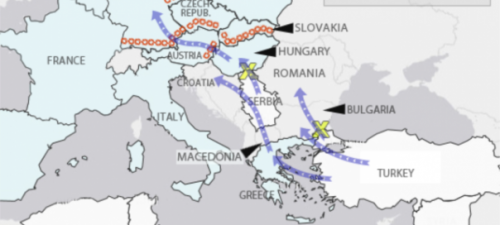
Trafficking in human beings is a grave violation of human rights and a serious form of organised crime. Important momentum was created with the adoption of the Anti-Trafficking Directive and the EU Anti-Trafficking Strategy, and Member States have been stepping up their efforts to effectively contribute to the prevention and combatting of this crime as well as providing adequate protection and assistance to the victims. On the occasion of the 10th EU Anti-Trafficking Day, the European Commission is today presenting a comprehensive policy review of anti-trafficking projects funded by the Commission between 2004 and 2015, while public authorities, civil society and citizens organise and participate in events all across Europe to mobilize social awareness. This review is one of the last remaining of the 40 priority actions enlisted in the EU Anti-Trafficking Strategy, which comes to an end in 2016.
Commissioner for Migration, Home Affairs and Citizenship, Dimitris Avramopoulos, said: "Today, one decade after we instituted the EU Anti-Trafficking Day, we call for renewed attention to this atrocious crime. Trafficking in human beings must be stopped. Today, new trends are calling for intensified efforts from all of us: migrants and refugees, especially vulnerable persons such as women or unaccompanied children, are suffering terrible experiences at the hands of traffickers. The profits from their exploitation go to the very same networks of organised crime that we are fighting daily with our security policies. We will continue to do so, supporting our Member States in this fight, legally, operationally and financially. We owe this to each and every victim."
EU Anti-Trafficking Coordinator, Myria Vassiliadou, added: "We will now build on the results of this study, which examines anti-trafficking projects funded by the Commission and their contribution towards the objectives of the EU Anti-Trafficking Strategy. Our priorities should be to focus on both the identification of and early and effective support for victims of trafficking, to fight against traffickers and to address the trafficking chains and improve our knowledge and understanding of trafficking through data collection at national and EU level. Whilst we continue to improve EU funding initiatives to better help Member States address trafficking, we expect them to effectively implement our legal and political commitments to tackle trafficking in human beings in the EU and across the globe."
The policy review examines 321 projects, with activities in over 100 countries worldwide with total funding of €158.5 million, according to their scope and geographic areas of intervention, as well as target beneficiaries, funding level, types of output and policy recommendations. It analyses project deliverables with a view to providing a solid basis for coherent, cost-effective and strategic planning, including for the further development of anti-trafficking policies at EU level. Commission funded projects have focused on child trafficking and trafficking for labour exploitation as well as trafficking for sexual exploitation, forced begging and organ removal, with around half of the projects addressing multiple forms of exploitation. The findings of the study further identified the next steps required to support future policy development identified.
Ahead of tomorrow's EU Anti-Trafficking Day, the EU is participating today in the 8th Conference of Parties of the United Nations Conference on Transnational and Organised Crime (UNTOC) in Vienna.
Background
Trafficking in human beings is a violation of fundamental rights, and is explicitly prohibited under the Charter of Fundamental Rights of the European Union. It is also listed as a crime in Article 83 of the Treaty on the Functioning of the European Union.
The EU Anti-Trafficking Directive adopted in 2011 put forward a victim centred approach, including a gender perspective, to cover actions in different areas such as criminal law provisions, prosecution of offenders, victims' support and victims' rights in criminal proceedings, prevention and monitoring of the implementation.
In its EU Strategy on Trafficking in human beings 2012-2016, the EU set out 40 concrete and practical measures against trafficking in human beings, putting the protection and rights of the victims at the forefront.
The EU Anti-Trafficking Coordinator is responsible for improving coordination and coherence among EU institutions, EU agencies, Member States and international actors and developing existing and new EU policies to address trafficking in human beings.
The EU Anti-Trafficking Day was established in 2007 following a recommendation of the European Parliament, and a proposal of the Commission. Ever since, 18 October is marked with events across the EU, bringing together all relevant actors working for eradicating trafficking in human beings.
For more information
Study: Comprehensive policy review of anti-trafficking projects










Add new comment